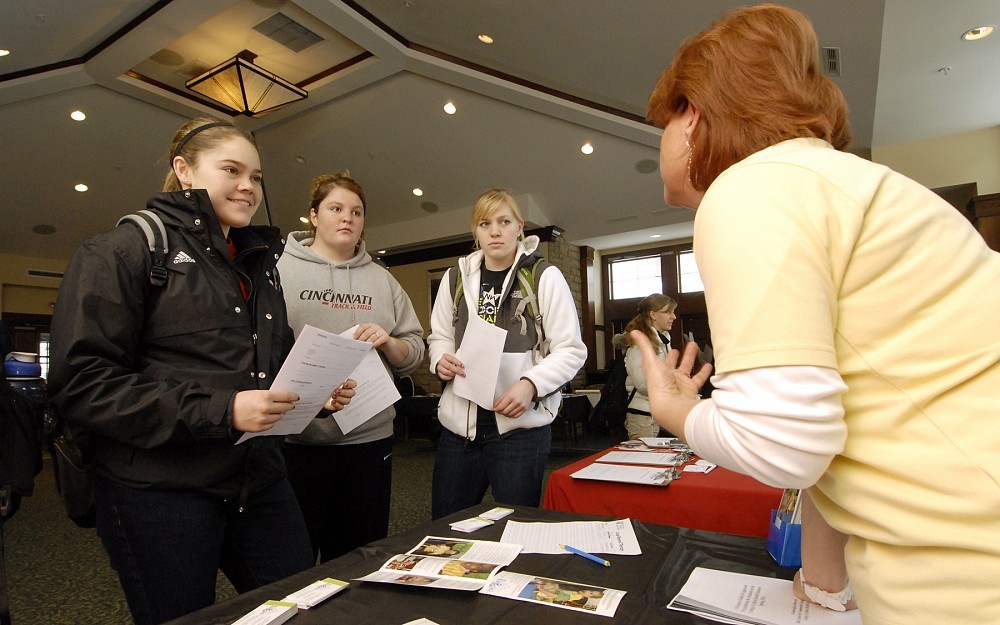
College of Allied Health Sciences Focuses on Students for Semester Conversion
By this time next year, faculty, staff and students at 13 of UC's colleges and one of its degree-granting units will have several months of semester conversion under their belts, with hopefully few hiccups. At the UC Academic Health Center (AHC), three collegesnursing, pharmacy and allied health scienceswill undergo the conversion, along with some of the graduate programs at the College of Medicine. All are working hard to ensure that their policies and procedures are updated to align with UCs new semester schematic
(more details of which can be found at uc.edu/conversion).
This month, were asking faculty and administrators at these AHC colleges to give us some insight into what the conversion means to existing and potential students there.
Below, Tina Whalen, head of the College of Allied Health Sciences Department of Rehabilitation Sciences, discusses how the conversion process will affect the college and university. Whalen is semester conversion liaison for the college and has been on UCs semester conversion committee for the past two years.
For more information on semester conversion, see the student guide at http://www.uc.edu/content/dam/uc/conversion/docs/faqs/guide.pdf
How has the College of Allied Health Sciences prepared for the conversion?
"The first piece of the conversion process, from the standpoint of the faculty, was converting classes from a quarter-based format to semesters. Now that those have been finalized and approved, the next step is advising students who have started in the quarter model and will graduate in the semester model.
"All these students will need an individual advising plan, so the university hired additional advisors last year to prepare for the conversion. At the college, each advisor is assigned to a specific cohort of students and theyre beginning to schedule those consultations now.
"In some cases they can do it virtually, but each of Allied Healths 1,600 students will have an IAP to make sure they will continue on schedule in their program after the semester conversion.
"Next, the semester conversion committee is working on aligning the universitys policies and procedures to a semester schedule. Dates for registration, deadlines for financial aidall of the dates have to be rearranged. Its pretty intensive and detailed.
"
Have you made any changes in anticipation of the conversion?
"Some of our faculty and department heads took the opportunity of the semester conversion to reorganize their programs, including re-bundling content or creating new courses.
"In the Health Science program, faculty renamed their two track options to more aptly describe the course content in them. Moving forward, the track for premed majors will be the 'physiological science track' and track for pre-PT and other pre-allied health majors will be the 'movement science track.'
"Because next summers break will be that much shorter in anticipation of the semester conversion, weve had to rearrange the clinical component to some of our classes as well.
The clinics themselves have to be in the loop and some summer classes have had to be rearranged.
"Were also adding bridge courses or transition courses for next year to ensure certain classes of student who are caught in 'transition' will have all the content they need in the appropriate order."
What should students/staff/faculty know about the conversion?
"Semester conversion has been a tedious, deadline-driven process, but in all of our plans, were trying to put the student at the center and keep the students at center.
"The reexamination that weve done as part of the conversion of our individual courses and programs has caused many of us to redesign and transform our curricula in a way that will directly benefit our students learning. I think that in the long run this decision will be good for the university.
"After enough time has passed and students begin graduating in the semester model, each program will be able to perform a program outcome assessment to determine whether the students are, in fact, meeting the program objectives that we set when the conversion occurred.
"The capacity to collect this data for each university program will be a first for UC its a commitment to quality programming and a very important activity to ensure continuous quality programming for our students.
"We hope that the regular collection of program assessment data after the conversion will foster a continuous improvement orientation among the faculty, which once again will ultimately benefit the students learning."
To read about how semester conversion will affect the College of Nursing, click here.
To read about how semester conversion will affect the James L. Winkle College of Pharmacy, click here.

Commonly referred to as French East, the Hastings L. and William A. French Building houses UC's College of Allied Health Sciences.
Related Stories
Can new rules in Ohio address a pharmacy staffing shortage and...
May 17, 2024
The University of Cincinnati's Michael Hegener joined WVXU's Cincinnati Edition to discuss recent rules released by the Ohio Board of Pharmacy designed to address pharmacy staffing.
Is ketamine the answer to treatment-resistant depression?
May 16, 2024
The University of Cincinnati's Stephen Rush joined WVXU's Cincinnati Edition to discuss the use of ketamine and esketamine to treat treatment-resistant depression.
Fellowship aimed at diversifying the nursing workforce...
May 15, 2024
To help prepare and expand a nursing workforce that is reflective of and responsive to an increasingly diverse patient population, UC College of Nursing launched its Cultivating Undergraduate Nursing Resilience and Equity (CURE) program in the fall of 2021.
